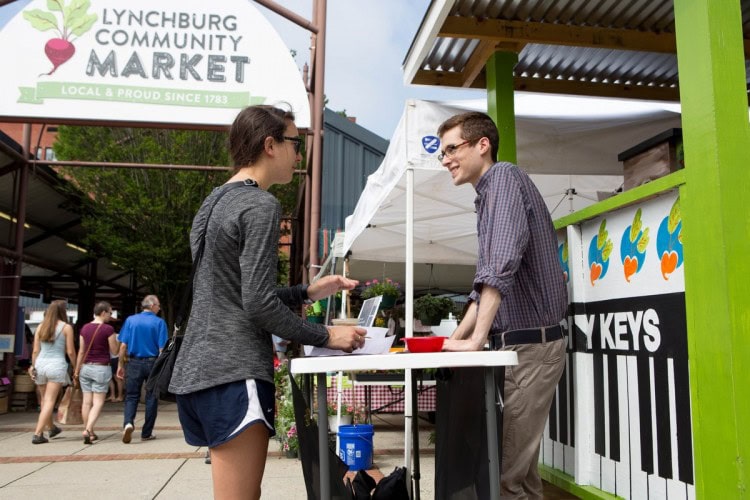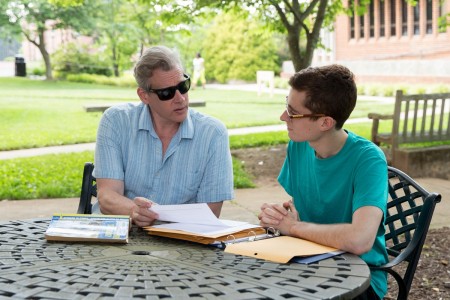Plugged in to environmental issues

Harrison Pippin ’18 talks to a patron of the Lynchburg Community Market.
Each weekend this summer, Harrison Pippin ’18 has traveled downtown and set up a table at the Lynchburg Community Market. He’s not there to sell fresh produce, however—he’s there for research.
As part of a Summer Research project with sociology professor Brad Bullock, Pippin has been administering a survey each week at the market, based on the New Ecological Paradigm (NEP) scale. First published in 1978, the NEP is used to measure the public’s world views as they relate to the environment. It was updated in 2002 to include more questions about climate change and mass pollution.
“It measures how human centric you are versus how ecologically focused your beliefs and values are,” Pippin said. “It’s probably the most commonly used measuring tool for environmental attitudes. It was a good idea to use this in the project because we can compare it with other similar studies.”

Sociology professor Brad Bullock and Harrison Pippin ’18 talk about their project.
In his survey, Pippin asks citizens to list their birth year, preferred source for environmental news (i.e. Internet, TV, newspaper), and how much time they spend reading about environmental issues. His hypothesis for the research is that more frequent Internet users are more aware of environmental issues and more likely to get involved in environmental causes.
Pippin believes the project is an opportunity to measure differences in Internet usage between generations as well. He and Bullock decided to administer the survey at the community market in order to obtain data from local citizens of all ages. A sociology and environmental studies major, Pippin is fascinated by the increasing popularity of the Internet and its ability to sway popular opinion—especially among millennials.
“I just think since my generation is going to be in charge of things soon, it’s important for us to know how the way we consume information is going to affect our decisions and opinions,” he said. “It seems like more and more the only way we really get any kind of information is through the Internet.”
Pippin will write a paper about his findings and submit it for peer review as part of Summer Research. He also plans to present his project during the upcoming academic year at Randolph’s Symposium of Artists and Scholars and the Mid-Atlantic Regional Conference for Undergraduate Scholarship (MARCUS).
“This is a really great project for understanding how human behavior is connected to the environment through our attitudes and through our values,” Bullock said. “Harrison is a great student, and when he came to me I agreed to do this because I also find so many connections—a lot of them in my own classes—between humans and the environment.”
After Randolph, Pippin will pursue a career in community development.
“If I’m going to work in that kind of area, I’ll be working with the public and hope to focus on sustainable development,” he said. “The research experience is really valuable. The skills I’m learning here can help me with so many other things in college and beyond.”
Tags: Brad Bullock, environmental studies, Harrison Pippin, sociology, student research, summer research, Summer Research 2016
